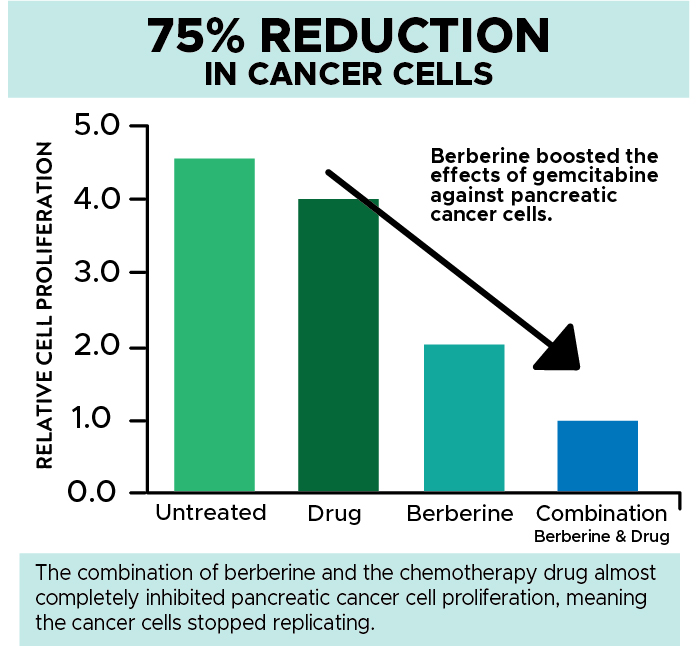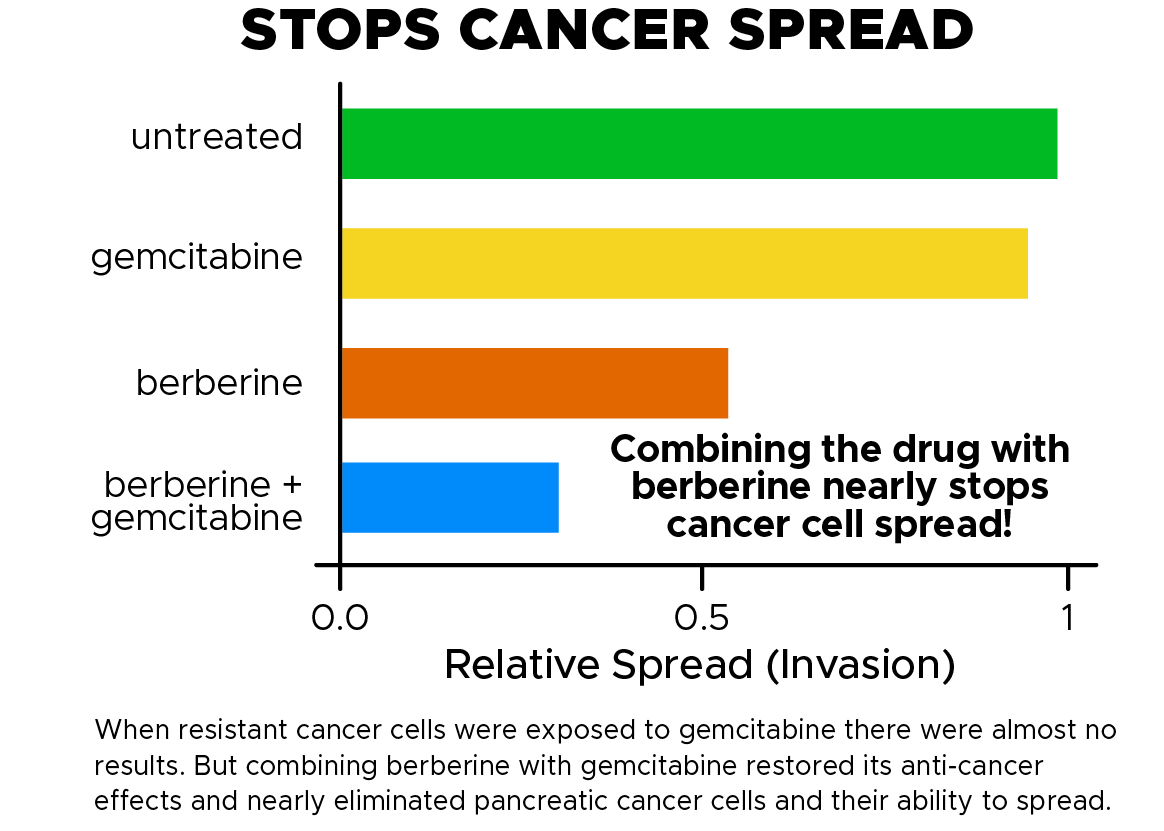BERBERINE IMPROVES GEMCITABINE CHEMOTHERAPY FOR PANCREATIC CANCER
Berberine Overcomes Gemcitabine-Associated Chemoresistance through Regulation of Rap1/PI3K-Akt Signaling in Pancreatic Ductal Adenocarcinoma.
Okuno K, Xu C, Pascual-Sabater S, Tokunaga M, Han H, Fillat C, Kinugasa Y, Goel A. Pharmaceuticals (Basel). 2022 Sep 28;15(10):1199.
Background: Gemcitabine (Gem)-based chemotherapy is one of the first-line treatments for pancreatic ductal adenocarcinoma (PDAC). However, its clinical effect is limited due to development of chemoresistance. Various naturally occurring compounds, including Berberine (BBR), provide an anti-cancer efficacy with time-tested safety, individually and in combination with chemotherapeutic drugs.
Methods: Accordingly, we hypothesized that BBR might enhance the chemosensitivity to Gem in PDAC. In this study, cell culture studies using MIA PaCa-2 and BxPC-3 cells, followed by analysis in patient-derived organoids were performed to evaluate the anti-cancer effects of BBR in PDAC. Considering that cancer is a significant manifestation of increased chronic inflammatory stress, systems biology approaches are prudent for the identification of molecular pathways and networks responsible for phytochemical-induced anti-cancer activity, we used these approaches for BBR-mediated chemosensitization to Gem.
Results: Firstly, Gem-resistant (Gem-R) PDAC cells were established, and the combination of BBR and Gem revealed superior anti-cancer efficacy in Gem-R cells. Furthermore, the combination treatment induced cell cycle arrest and apoptosis in Gem-R PDAC cells. Transcriptomic profiling investigated the Rap1 and PI3K-Akt signaling pathway as a key regulator of Gem-resistance and was a key mediator for BBR-mediated chemosensitization in PDAC cells. All cell culture-based findings were successfully validated in patient-derived organoids.
Conclusion: In conclusion, we demonstrate that BBR-mediated reversal of chemoresistance to Gem manifests through Rap1/PI3K-Akt signaling in PDAC.
Pancreatic cancer is so deadly because it is typically advanced by the time it is diagnosed, and pancreatic cancer cells quickly become resistant to chemotherapy drugs. Dr. Ajay Goel and his team have found that berberine fights cancer cell growth on its own, inhibits resistance to gemcitabine, a commonly used chemotherapy drug, and works in combination with it, greatly enhancing its effectiveness. These results are very exciting and show the great potential of natural compounds in stopping cancer and improving conventional treatment.
What This Means for You:
• Gemcitabine is a chemotherapy drug used for pancreatic cancer, but cancer cells become resistant to its effects, and it can be toxic for patients at higher dosages.
• Berberine has anti-cancer effects, including on pancreatic cancer cells. It can stop the cycle of cancer cell growth and induces apoptosis (cancer cell death).
• Berberine reverses cancer cell resistance to gemcitabine, making the drug more effective.
• Combining berberine and gemcitabine strongly inhibited resistant cancer cells, keeping cancer proliferation and colony formation at practically zero.

Berberine Overcomes Pancreatic Cancer Chemoresistance
Pancreatic cancer is the seventh-leading cause of cancer death in the world and is on track to become the second leading cause of cancer-related death in the United States by 2030. It is a fast-moving disease, with low 5-year survival rates of 8 to 10 percent. And although there are chemotherapy drugs available, including the drug gemcitabine, pancreatic cancer cells quickly develop resistance, making treatment especially difficult.
Combining gemcitabine with other chemotherapy drugs has been tried, but is expensive, and ultimately, even more toxic. That is why researchers are looking for other ways of addressing the problem that don’t add to the burden of toxicity and can stop cancer progression.
Berberine, a natural compound found in many plants, including Indian Barberry (Berberis aristata), has been shown in previous research to have strong anti-cancer actions.

The researchers found that berberine restored sensitivity to gemcitabine in resistant cancer cells and greatly inhibited their proliferation and spread. And while berberine performed well on its own, combined with gemcitabine, the two consistently delivered the strongest results, inducing cancer cell death by 70 percent. The combination of berberine and gemcitabine almost completely inhibited the formation of cancer cell colonies by resistant cells, an incredible testimony to the synergy of these medicines.
In some ways, these results aren’t surprising—berberine has already shown effective anti-cancer actions in previous research. It’s also important to keep in mind that over 40 percent of anticancer drugs developed in the past 40 years have their origin as naturally occurring compounds, and we’re still learning the mechanics of how those medicines stop tumor formation and growth.
This study illustrates the potential of pairing strong botanicals with conventional therapies. More research is needed, but combining berberine with gemcitabine may help overcome some of the greatest challenges in fighting pancreatic cancer, one of the most aggressive and deadliest cancers.


